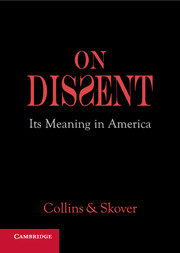Book contents
- Frontmatter
- Contents
- Informationis Personae
- Prologue
- Chapter I From Judicial Dissent to Peaceful Protest
- Chapter II From Civil to Uncivil Disobedience
- Chapter III The Vagaries of Violence
- Chapter IV Dissent, Inc.
- Chapter V Dissent and Law's Parameters
- Epilogue
- Notes
- Acknowledgments
- About the Authors
- About the Informationis Personae
- Select and Annotated Bibliography
- Index
Chapter IV - Dissent, Inc.
Published online by Cambridge University Press: 05 May 2013
- Frontmatter
- Contents
- Informationis Personae
- Prologue
- Chapter I From Judicial Dissent to Peaceful Protest
- Chapter II From Civil to Uncivil Disobedience
- Chapter III The Vagaries of Violence
- Chapter IV Dissent, Inc.
- Chapter V Dissent and Law's Parameters
- Epilogue
- Notes
- Acknowledgments
- About the Authors
- About the Informationis Personae
- Select and Annotated Bibliography
- Index
Summary
Dissent is not easily cabined; it resides in many quarters and goes by many names. It manifests its opposition to orthodoxy in religious realms, political circles, economic arenas, and other social and cultural contexts. How it does so – that is, how it protects and perpetuates itself – is not always as apparent as we may think. Frequently, its full face is veiled; there is sometimes more to dissent than meets the eye, more than the image of the lone dissident. By way of lifting that veil, consider the following hypothetical scenarios:
It is 1945. Thirty Jehovah's Witnesses invade the company town of Chickasaw, Alabama. For weeks, they preach their entrenched beliefs – that Satan is the leader of the current world order; that saluting the flag, singing the national anthem, and wearing a cross are forbidden forms of idolatry; that Armageddon will cleanse the earth of sin; and that only 144,000 Christians will ascend to God's kingdom to rule with Jesus over the chastened faithful. Their evangelicalism stirs the derision and disgust of the town's folk, leading to civil unrest. Things escalate to the point that the town erects signs that read: “Private property. No trespassing. Jehovah's Witnesses strictly prohibited.” Undeterred by citations and arrests for trespass, the Witnesses continue to preach and practice their gospel. Hoping to strike a more devastating blow, the owner of the company town brings a civil action against the religious group for injunctive relief and compensatory and punitive damages.
In 1951, nine members of the House of Representatives, sitting as the House Un-American Activities Committee (HUAC), investigate charges of subversive threats and political propaganda assailing “the form of government guaranteed by our Constitution.” The Committee acts pursuant to a federal law that bars Communists from working in designated government agencies and that bans the Communist Party USA from expending money to promote candidates for federal office. In the course of the HUAC proceedings, numerous Party members unflinchingly reaffirm their unpopular political beliefs, denounce the federal law as an unconstitutional bill of attainder, contest the Committee's authority and oppressive conduct, and charge it with violating their constitutional rights. Nonetheless, the persecution and prosecution of the Communist Party continues.
. . .
- Type
- Chapter
- Information
- On DissentIts Meaning in America, pp. 81 - 102Publisher: Cambridge University PressPrint publication year: 2013

